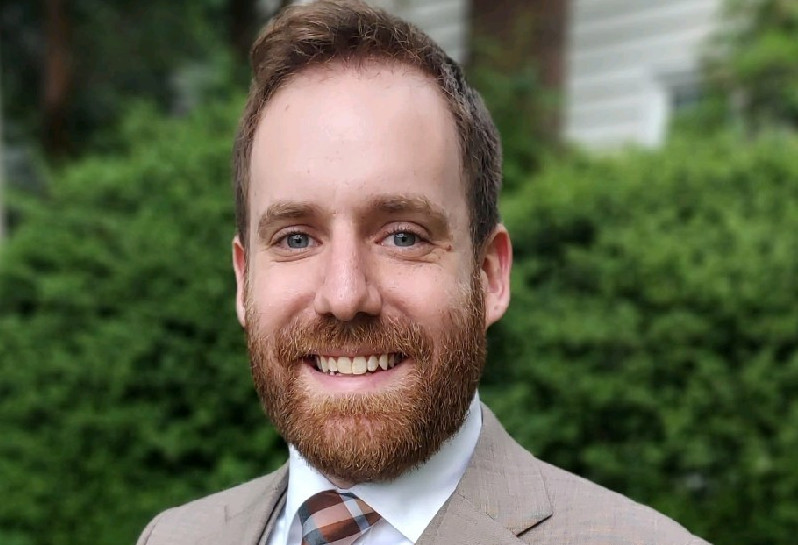Jesse Leon: From Real Estate to Law School – A Non-Traditional Student's Journey and Aspirations

Jesse Leon is a 3L day student at Seton Hall Law. After graduation, Jesse will be clerking for The Honorable Frank Covello, Passaic County, Court of General Equity.
Tell us a little bit about yourself.
I'm a 3L from Teaneck, New Jersey, where I live with my wife and two children. I graduated
from CUNY Queens College in 2011 and worked for about eight years in the real estate
industry before deciding to come to Seton Hall. I'm an articles editor for Volume
48 of the Seton Hall Law Journal of Legislation and Public Policy, and this semester
I am working as an extern at the Institute for Justice.
Why did you decide to go to law school?
I ran away from the idea of law school in college; it felt too typical, and I was
making my post-grad decisions during the recession when lawyers were being laid off.
I fell into real estate, and inertia kept me at my job, but I was increasingly looking
for a way out. After I quit, I was trying to figure out my next steps, and my wife
(who knows me better than I know myself) asked me: "Why don't you go to law school?"
I had a knee-jerk negative reaction to that question, but after reflecting on what
scared me about law school ten years before, I realized that I had grown past those
fears, and it was the right place for me.
You are a non-traditional law student, as you didn’t come to Seton Hall Law straight
from college. What was it like getting back into school mode? What are some of the
challenges you have faced as a non-traditional student?
Studying for the LSAT was tough because I had to rebuild my testing stamina. Once
I got past that, I was excited to be in the classroom again, and I've been telling
everyone that school is much more fun than working. I love to learn and had been considering
pursuing a master's degree for a few years. The hardest part about being a non-traditional
student is finding my school-life balance in a program designed more for students
with fewer existing commitments. I don't take night classes, which limits my course
options; I have to plan logistics weeks ahead if there is an event I really want to
attend; and part of the calculus that goes into developing my class schedule is figuring
out who is home to get my kids off the bus. And, during 1L year, I nervously counted
and recounted my absences after my daughter brought a case of coxsackie home from
daycare and then generously shared it with me.
You worked at the Renzulli Law Firm this past summer. What was your experience like?
How did you get your job?
I really enjoyed working at Renzulli. The firm practices civil litigation defense
for the firearms industry, so I was exposed to a broad range of legal issues from
ordinary negligence cases, patent and copyright infringement, and insurance claims,
to more complex cases that touch on some of the sensitive issues in the national gun
control debate. I got the job by being curious. One of my 1L professors mentioned
a former classmate who worked in gun law. I approached her outside of class and asked
her to connect us because I thought that was interesting. After meeting with him,
he passed me along to Renzulli.
What was the most interesting project you worked on at Renzulli?
There is a lot of ongoing litigation around the 2005 Protection of Lawful Commerce
in Arms Act ("PLCAA"), which shields firearms manufacturers and sellers from liability
when third parties criminally misuse their products. I learned a lot about the PLCAA,
and worked on two big ongoing cases where the applicability of the PLCAA's protection
was at issue.
What are your plans for post-graduation and what are you most looking forward to?
I accepted a clerkship with The Honorable Frank Covello, in the Passaic County Court
of General Equity. I'm most looking forward to starting work again. As much as I've
loved law school, I'm ready to dive into my new career, and learning from a fantastic
judge in a busy courtroom is exactly the kind of start I'm looking for.
What are your long-term goals for your legal career?
My passion is for protecting individual rights and civil liberties, so I dream of
working for an organization that prioritizes that goal. I half-jokingly tell people
that I want to sue the government for a living, but I have not refined that broad
category much more yet. Lately, I've been considering starting my own non-profit,
public interest litigation firm one day.
Is there anyone who has served as an inspiration for you in life or your professional
career?
My late grandfather, the son of Lithuanian-Jewish immigrants, worked for decades in
a pants factory in midtown Manhattan to raise his three daughters and propel them
into the middle class. He worked hard and cultivated a strong culture of love and
support in my family. He suffered from a lot of physical pain from a chronic condition,
but always exuded happiness when he was with his children and grandchildren. To me,
he is an example of finding the right balance and knowing your priorities, which has
helped guide me in many of my school and career decisions.






